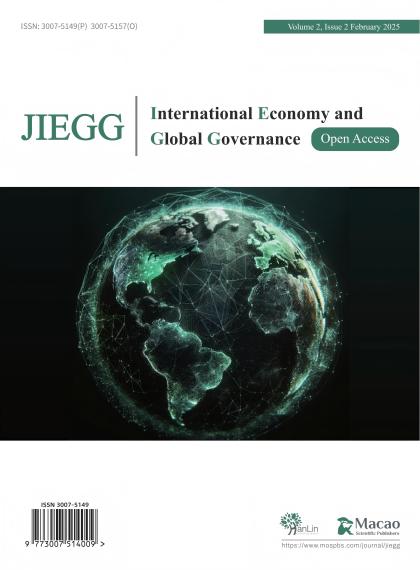-
Zeng, J. (2020) Slogan Politics: Understanding Chinese Foreign Policy Concepts. London: Palgrave Macmillan.
-
Allison, G., Blackwill, R. D., and Wyne, A. (2013) Lee Kuan Yew: The Grand Master’s Insights on China, the United States, and the World. Boston: MIT Press, 42.
-
Xi, J. (2022) “Rising to Challenges and Building a Bright Future Through Cooperation.” Ministry of Foreign Affairs of the People’s Republic of China.
-
Finkelstein, D. M. (2001) “China’s “New Concept of Security”- Retrospective & Prospects,” Proceedings of the National Defense University Conference: The Evolving Role of the People’s Liberation Army in Chinese Politics, Washington D.C.
-
Wu, B. (2011) The Chinese Security Concept and its Historical Evolution,” Journal of Contemporary China, 10(27): 275-283.
-
Ross, R. S. (1999) “The Geography of the Peace: East Asia in the Twenty-First Century,” International Security, 23(4): 81-118.
-
Allison, G. (2018) Destined for War: Can America and China Escape Thucydides’ Trap? Mariner Books, 89-132.
-
Ford, L. W. (2020) “Network Power: China’s Effort to Reshape Asia’s Regional Security Architecture,” Brookings Institution.
-
Pitlo III, L. B. (2021) “China’s “New Asian Security Concept”: Leading a Regional Security Community or Simply Pushing Rivals Out?” Chinese Studies Journal, 15: 56-80.
-
Hirono, M., Jiang, Y., and Lanteigne, M. (2019) “China’s New Roles and Behaviour in Conflict-Affected Regions: Reconsidering Non-Interference and Non-Intervention,” The China Quarterly, 239: 573-593
-
Mu, R. (2021) Beyond Rigidity: China’s Non-Intervention Policy in the Post-Cold War Period. London, Palgrave Macmillan.
-
Liu, R. and Liu, F. (2017) “Contending Ideas on China’s Non-Alliance Strategy,” The Chinese Journal of International Politics, 10(2): 151-171.
-
Zagoria, D. S. (1962) The Sino-Soviet Conflict: 1965-1961. Princeton University Press.
-
Mearsheimer, J. J. (2013) Why Leaders Lie: The Truth About Lying in International Politics. Oxford University Press.
-
Doshi, R. (2021) The Long Game: China’s Grand Strategy to Displace American Order. Oxford: Oxford University Press, 42-43
-
Yan, X. (2014). “China’s New Security Concept Under Multilateral Diplomacy.” Carnegie Endowment for International Peace.
-
Jiang, Z. (2014) “Asian Security Concept and Its Implications for Regional Order from a Normative Perspective,” Peace and Development, 5: 122-132.
-
Zhang, Y. and Zhang Z. (2023) “China’s Views on Solving the Yemeni Issue Within the Framework of Global Security Initiative,” Asian Journal of Middle Eastern and Islamic Studies, 17(3): 217-230.
-
Yao, B. and Li, M. (2024) “Decoding China’s Global Governance Initiatives: Insights from Southeast Asia,” Southeast Asian Affairs: 38-51.
-
Song, Q. and Wang, B. (2024) “The Global Security Initiative and China-Thailand Non-Traditional Security Cooperation,” China International Strategy Review: 1-22.
-
Arase, D. (2022) “China’s Global Security Initiative Stoking Regional Tensions,” ISEAS Fulcrum, 15.
-
Arase, D. (2023) “China’s Global Security Initiative: Narrative, Origins and Implications,” Southeast Asian Affairs: 34-50.
-
Zhao, K. (2022) “Innovations in the Global Security Initiative,” 现代国际关系(英文版), 32(6): 7-10.
-
Wang, F. (2022) “Global Security Initiative and China’s Foreign Policy,” 现代国际关系(英文版), 32(6): 18-23.
-
Xu, B. (2022) “Epic Significance of the Global Security Initiative for World Peace,” 现代国际关系(英文版), 32(6): 1-6.
-
Ka, L, Y. (2024) “Reading China’s Global Security Initiative Through an International Legal Lens,” Chinese Journal of Transnational Law, 1(2): 198-210.
-
Kewalramani, M. (2023) “China’s Global Security Initiative: Undermining US Alliances or Quest for a New Security Architecture,” Takshashila Discussion Document, 1(27).
-
Han, A. (2022) “The Global Security Initiative and Building a New Neighborhood Security Architecture,” 中国国际问题研究, 4: 41-71.
-
Mitić, A. (2023) “The Strategic Communication of China’s Global Security Initiative” in New Chinese Initiatives for a Changing Global Security. Proceedings of the 3rd International Academic Conference – Dialogues on China, ed. Aleksandar Mitić and Nenad Stekić. Belgrade: Institute of International Politics and Economics, 263-281.
-
Jing, L., Ma Y., and Zhong, Y. (2023) “The Core Content and Practical Approach of China’s Global Security Initiative,” Pacific International Journal, 6: 7-11.
-
Seow, I. C. W. (2023) “The Global Security Initiative of China,” RSIS Commentaries, 107.
-
Javid, S. (2022) “China’s Global Security Initiative and Global Development Initiative: A Challenge to US-led Global Order,” Focus: 1-21.
-
China Institute of International Studies. (2024) Report on the Implementation Progress of the Global Security Initiative. Beijing: China Institute of International Studies.
-
Yan, X. (2014) “From Keeping a Low Profile to Striving for Achievement,” The Chinese Journal of International Politics, 7(2): 153-184.
-
Yan, X. (2020) Leadership and the Rise of Great Powers. Princeton: Princeton University Press.
-
Mansfield, E. D. (1993) “Concentration, Polarity, and the Distribution of Power,” International Studies Quarterly, 37: 105-128.
-
Schweller, R. L. (1993) “Tripolarity and the Second World War,” International Studies Quarterly, 27: 73-103.
-
Waltz, K. N. (1979) Theory of International Politics. New York: Random House.
-
Mearsheimer, J. J. (2001) The Tragedy of Great Power Politics. Oxford: Oxford University Press.
-
Tang, S. (2010) Defensive Realism: A Theory of Security Strategy for Our Time. London: Palgrave Macmillan.
-
Yang, J. (2017) “Continue to Create New Prospects for Foreign Policy Work under the Guidance of General Secretary Xi Jinping’s Diplomatic Thought,” Ministry of Foreign Affairs of the People’s Republic of China.
-
Xi, cited in Doshi, R. (2021) The Long Game: China’s Grand Strategy to Displace American Order. Oxford: Oxford University Press, 267.
-
Xi, cited in Doshi, R. (2021) The Long Game: China’s Grand Strategy to Displace American Order. Oxford: Oxford University Press, 263.
-
Ministry of Foreign Affairs of the People’s Republic of China. “The Global Security Initiative Concept Paper.” Ministry of Foreign Affairs of the People’s Republic of China.
-
Wang, Y. (2022) “Acting on the Global Security Initiative to Safeguard World Peace and Tranquility.” Ministry of Foreign Affairs of the People’s Republic of China.
-
Chen, X. (2024) “Implementing the Global Security Initiative to Build a World of Lasting Peace and Universal Security,” Ministry of Foreign Affairs of the People’s Republic of China.
-
Xi, J. (2022) “Rising to Challenges and Building a Bright Future Through Cooperation,” Ministry of Foreign Affairs of the People’s Republic of China.
-
Doshi, R. (2021) The Long Game: China’s Grand Strategy to Displace American Order. Oxford: Oxford University Press.
-
Sun, X. (2013) Dilemma of China’s Rise: Theoretical Reflections and Strategic Choices. Beijing, Social Sciences Academic Press.
-
Doshi. The Long, 20-24.
-
Ibid, 261-276.
-
Sun. Dilemma, chapter 2.
-
Doshi, R. The Long, 170-179.
-
Wang. “Acting”.
-
Le, Y. (2022) “Acting on the Global Security Initiative To Safeguard World Peace and Tranquility,” Ministry of Foreign Affairs of the People’s Republic of China.
-
Han, Z. (2023) “Build a Community with a Shared Future for Mankind and Jointly Deliver a Brighter Future for the World,” Ministry of Foreign Affairs of the People’s Republic of China.
-
Nong, R. (2023) “Jointly Implementing the Global Security Initiative For Lasting Peace and Security of the World,” Ministry of Foreign Affairs of the People’s Republic of China.
-
Wang, Y. (2024) “Self-Confidence and Self-Reliance, Openness and Inclusiveness, Fairness and Justice, and Win-Win Cooperation,” Ministry of Foreign Affairs of the People’s Republic of China.
-
Li, Q. (2023) “Following the Vision of a Community with a Shared Future for Mankind and Bringing More Certainty to World Peace and Development,” Ministry of Foreign Affairs of the People’s Republic of China.
-
Wang, Y. (2022) “Upholding Peace, Development, Independence and Inclusiveness And Renewing the Firm Commitment to Open Regionalism,” Ministry of Foreign Affairs of the People’s Republic of China.
-
Wang, Y. (2022) “Jointly Building an Asia-Pacific Community with a Shared Future,” Ministry of Foreign Affairs of the People’s Republic of China.
-
State Council Information Office. (2023) “A Global Community of Shared Future: China’s Proposals and Actions,” State Council Information Office

